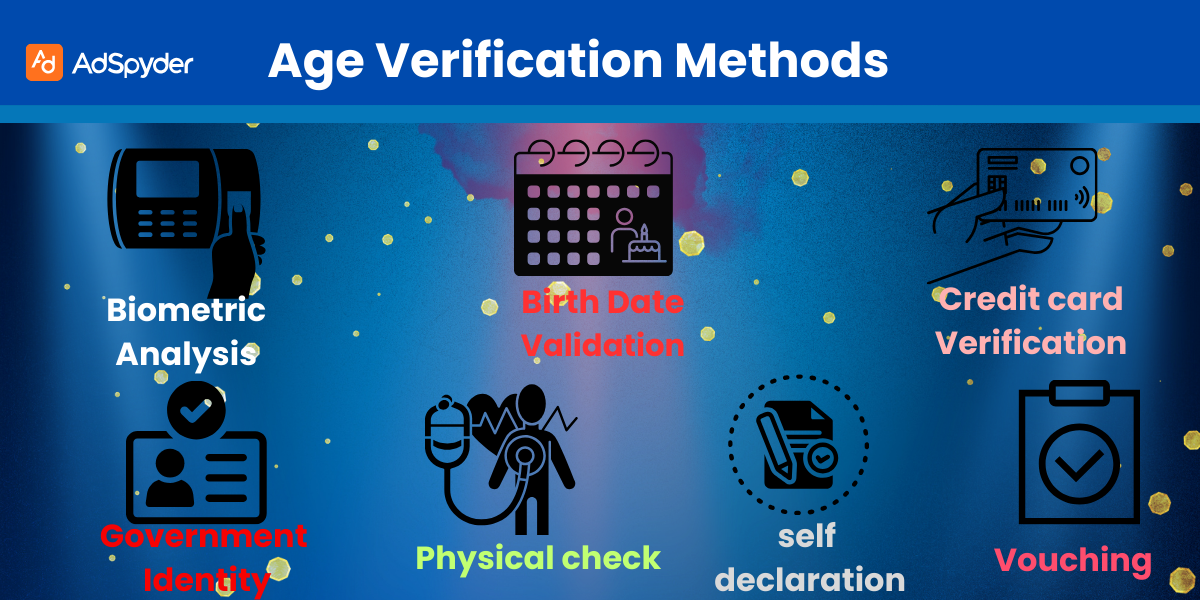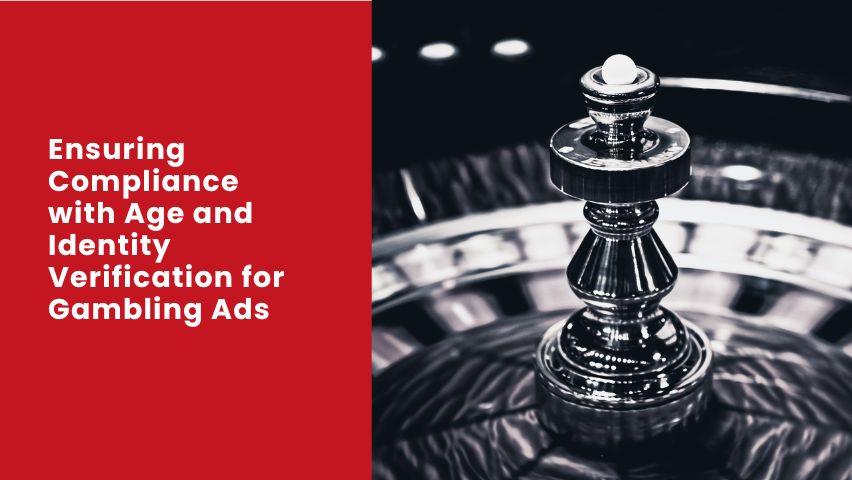In the realm of gambling advertising, ensuring age verification in gambling and robust identity checks stand as the cornerstone of responsible and lawful practices. It is the solemn duty of advertisers to institute stringent verification procedures, preventing underage gambling and adhering to regulatory mandates. This blog delves into the pivotal role of age and identity verification in gambling advertising, explores diverse verification methodologies, and underscores the significance of responsible ad targeting.
Ready to Elevate your Marketing Strategy?
Age Verification in Gambling: Methods for Gambling Ads

Age verification constitutes a fundamental tenet of responsible gambling advertising. Advertisers must institute dependable age verification systems to thwart minors from accessing gambling content. These systems employ an array of techniques, encompassing date of birth validation and scrutiny of identity documents, to affirm that users meet the requisite legal age for gambling. These steps form a part of promoting responsible gambling across the digital space. Additionally, with the rise of Short Form Video Marketing, systems that rent short video content must also ensure age verification before showing any playing-related commercials.
In the United Kingdom, the Gambling Commission mandates age verification for all users before granting access to gambling content, with the express purpose of forestalling underage gambling.
Age Verification Methods in Gambling Websites
Here’s a detailed table summarizing various age verification methods used by gambling websites to ensure compliance and prevent underage access:
| Method | Description | Advantages | Challenges |
|---|---|---|---|
| Date of Birth Verification | Users enter their date of birth at sign-up to verify age. | Simple and quick to implement. | Can be easily bypassed by entering false information. |
| Document Verification | Users upload ID documents like passports or driver’s licenses for manual or automated review. | Provides high accuracy and compliance. | Time-consuming and may deter users due to privacy concerns. |
| Credit Card Verification | Users provide credit card details, and the age is verified through the issuing bank. | Effective as only adults can own credit cards. | Excludes potential users without credit cards. |
| Third-Party Verification | Uses external databases to cross-check user information, such as electoral rolls. | Quick and reliable, leveraging extensive databases. | Potential privacy issues; dependent on database accuracy. |
| Social Media Verification | Links social media accounts to verify age based on profile information. | Convenient for users already logged into social media. | Inconsistent accuracy; can be circumvented with fake profiles. |
| Mobile Network Verification | Age is verified through the user’s mobile network provider. | High accuracy; only available to verified account holders. | Limited to regions where such verification is supported. |
| Biometric Verification | Uses facial recognition or fingerprint scanning for age verification. | Highly secure and accurate. | Expensive and complex to implement; raises privacy concerns. |
These methods vary in complexity and accuracy, and many gambling websites use a combination of these techniques to ensure comprehensive age verification and compliance.
Compliance with Age Restrictions Across Jurisdictions
Distinct jurisdictions may proffer disparate age prerequisites for gambling. Advertisers must meticulously ensure compliance with these age requisites to forestall legal entanglements. By comprehending the age restrictions in each target market, advertisers can institute apropos age verification processes in alignment with regulatory benchmarks. They can also find this as an advantage over their competitors when it comes to running ad campaigns, that utilize Native advertisements, which blend more seamlessly with platform content material whilst nevertheless adhering to vital rules
In the USA, the lawful gambling age varies by state, with most states stipulating a minimum age of 21 for casino gambling and 18 for lottery and pari-mutuel betting. Complying with these laws from local regulatory bodies require adding checks for age verification. These checks need to be different based on geolocation and should be monitored closely.
Detailed Compliance Information by Country
| Jurisdiction | Legal Gambling Age | Verification Methods |
| United States | 18-21 (varies by state) | ID checks, social security verification, geolocation |
| United Kingdom | 18 | Document verification, credit checks, third-party databases |
| European Union | 18 | ID and biometric checks, database cross-references |
| Australia | 18 | Document and digital wallet verification |
| Canada | 18-19 (varies by province) | Document verification, credit card checks |
| Japan | 20 | My Number system verification, document checks |
| India | Varies by state | Document and mobile verification |
Identity Verification and KYC (Know Your Customer)
Identity verification, often referred to as Know Your Customer (KYC), emerges as yet another vital facet of responsible gambling advertising. The verification of user identities acts as a bulwark against fraudulent activities like the creation of multiple accounts or identity theft, thereby fostering a secure gambling milieu. However it is crucial to make certain that the content objectives the proper target audience and adheres to gambling policies.
Nonetheless, advertisers must adroitly navigate the fine line between acquiring requisite user information for verification and respecting user privacy.
A significant 62% of consumers nurse concerns regarding sharing personal information online, underscoring the pivotal role of privacy in identity verification processes.
Geolocation and IP Verification
Geolocation and IP verification are crucial methods used by gambling websites to ensure compliance with regional laws. It also prevents access by underage users or those in restricted areas.
- IP Address Analysis: Websites track the user’s IP address to determine their geographic location. This helps in restricting access based on country or state regulations. It is fairly effective in blocking people belonging (or not belonging) to a geographical region.
- Geolocation Software: Advanced software pinpoints the user’s exact location using GPS, Wi-Fi, and network data, ensuring they are in a permissible region. Then the website can block a user who does not belong to the prescribed region.
- VPN Detection: Systems are in place to detect and block access through VPNs or proxies, which users might use to bypass restrictions.
- Compliance Enforcement: Websites use these methods to comply with local gambling laws and avoid legal repercussions for unauthorized access.
- Dynamic Blocking: Real-time verification ensures that users can’t access the site if they move into a restricted area during a session.
These methods help create a secure and legally compliant online gambling environment by preventing unauthorized or underage access based on location.
Age Verification in Gambling: Responsible Ad Targeting

Responsible ad targeting in the gambling industry is critical to ensure that promotional content reaches only those who are legally allowed to participate. Age verification plays a key role in this process:
- Age-Appropriate Audience Segmentation: Ads are targeted only to verified adult users, ensuring minors are excluded from receiving gambling-related content. This ensures compliance against norms stipulated by most countries.
- Use of Age-Gated Platforms: Advertisers leverage platforms that verify age, such as certain social media and search engines, to limit exposure to underage users. Though not perfect, it is a good point to use for easy and accurate age verified targeting of ads.
- Restrictions on Sensitive Channels: Ads are restricted on channels frequented by minors, like gaming apps and youth-oriented websites.
- Contextual Targeting: Ads are placed in contexts appropriate for adult audiences, avoiding content aimed at younger users.
Implementing these strategies helps gambling operators promote their services responsibly, complying with regulations and upholding ethical standards.
Conclusion
Adhering to age verification in gambling and identity verification requirements represents a cardinal imperative for gambling advertisers. This underpins responsible and legal conduct. Age verification protocols serve as a bulwark against underage gambling. Also, identity verification and KYC foster an environment of safety and security. Ads are beamed to authorized regions through geolocation and IP verification. Responsible ad targeting averts inadvertent outreach to underage cohorts. By investing in age and identity verification, gambling advertisers can make laudable contributions to the cause of responsible gambling and perpetuate a positive industry reputation.




